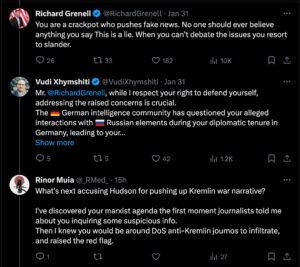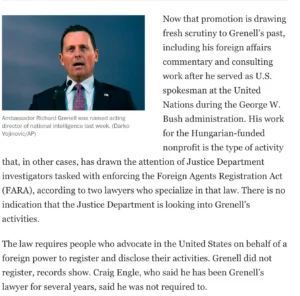Richard Grenell, a figure engulfed in diplomatic controversies, has faced scrutiny for his ties with Vladimir Plahotniuc and alleged lobbying for Serbia. His actions, clashing with EU and U.S. interests, raise questions about his diplomatic integrity. Grenell’s behavior, alongside allegations of receiving undisclosed payments and involvement in a contentious land swap deal, casts a shadow on his international dealings, suggesting a conflict with the principles of transparent and ethical diplomacy.
As a journalist deeply engaged in the intricate dynamics of international diplomacy, I find myself compelled to address the recent conduct of Richard Grenell, former Acting Director of the United States National Intelligence. My interactions with him, particularly in response to his claims on Albin Kurti, the Prime Minister of Kosovo, and the subsequent social media exchanges, have laid bare a concerning pattern of evasion and lack of civility that I believe warrants public scrutiny.

In confronting Grenell with legitimate concerns regarding his alleged connections to Russian interests and his expulsion from Germany by the German intelligence community, I was met not with reasoned argument or clarifications, but with dismissive and alarmingly uncivil retorts. Grenell resorted to calling me a “crackpot” and accusing me of spreading “fake news.” This behaviour is not only unbecoming of a diplomat, whose role demands a level of decorum and engagement with criticism, but it also undermines the very essence of diplomatic accountability.
The gravity of Grenell’s failure to openly address allegations about the his involvement with Russian interests cannot be overstated. In the realm of international relations, transparency is crucial. His expulsion from Germany raises serious concerns about national security and international diplomacy, and his reluctance to clarify these matters casts a long shadow over his credibility and the integrity of the institutions he represented.
Equally troubling is Grenell’s association with President Aleksandar Vucic of Serbia, a figure linked with justifying actions deemed crimes against humanity during the Balkan wars. By appearing to lobby for a country aligned with Russia, America’s geostrategic adversary, Grenell’s actions raise alarming questions about his judgment and the ethical considerations of his diplomatic endeavours.
Moreover, the mobilisation of Grenell’s supporters against me, in response to my raising these valid concerns, paints a distressing picture. It suggests a diplomat more concerned with personal defence than engaging critically with the issues at hand. This approach not only undermines his own credibility but erodes public trust in diplomacy.
In my view, the role of a diplomat is to uphold the principles of transparency, accountability, and respect for democratic values, even in the face of criticism. Grenell’s conduct, as I have personally witnessed, raises significant doubts about his adherence to these principles. His reluctance to address critical allegations, his incivility in discourse, and his questionable associations are deeply concerning.
Based on my interactions and observations, Richard Grenell’s behaviour and apparent evasions are troubling. They not only question his suitability for diplomatic roles but also reflect poorly on the values and integrity of international diplomacy. Diplomacy demands more than just advancing national interests; it requires a steadfast commitment to the values that define those interests, including honesty and openness. Without these, the very fabric of international relations is compromised.

Let’s talk more about Grenell, shall we?
Richard Grenell’s career, marked by controversies and diplomatic tensions, includes allegations of lobbying for Serbia, strained relations with Germany, and questionable associations with figures like Vladimir Plahotniuc, a Moldovan official linked to major financial scandals and Vladimir Putin of Russia. His dealings, often at odds with EU interests and U.S. foreign policy norms, raise questions about his diplomatic integrity and the nature of his global engagements.
In the article “Who is Richard Grenell?“ by Bronwyn Jones in Kosovo 2.0, Grenell is portrayed as a controversial figure in the context of Kosovo and Serbia relations. He is described as a pivotal force in U.S. policy in Kosovo, known for opposing the trade tariff on Serbian goods and threatening Kosovo with the withdrawal of U.S. support. His actions have reportedly caused tensions in the transatlantic alliance. Additionally, Grenell’s appointment as the special presidential envoy to the Kosovo-Serbia dialogue by former U. S. Administration led by President Trump is highlighted as a significant move, especially considering his background and his approach to the role.
According to a 2020 Deutsche Welle article titled “US-Botschafter Grenell verlässt Berlin,“ Richard Grenell, former U. S. Ambassador to Germany and later Acting Director of US National Intelligence, was known for his unorthodox and often undiplomatic methods in representing Trump’s policies. His approach reportedly caused friction in Berlin’s political circles, leading to strained relations and suggestions from some opposition members to declare him an undesirable person. This marked a contentious phase in US-German relations during his tenure.
An article from the Albanian outlet SOT.al discusses allegations against Richard Grenell, the former White House envoy for the Kosovo-Serbia dialogue. Serbian analyst Dusan Janjic claimed that Grenell receives $100,000 a month from Serbia for lobbying, which Grenell strongly denied, labelling it as “fake news” and a disgrace. He insisted that he did not receive any money from Belgrade. Janjic, however, maintained that Grenell openly defends Serbia’s interests and suggested significant amounts of money have been given for lobbying.
In another article by Filip Milacic for EURActiv, Richard Grenell, former US special envoy for Serbia and Kosovo, is implicated in a controversy involving a secret deal between the presidents of Serbia and Kosovo. The deal, allegedly brokered by Grenell, includes a land swap and has drawn criticism for being contrary to EU interests. It suggests Grenell’s actions may have favoured Serbian interests over the EU’s and could have implications for Serbia’s foreign policy, particularly in relation to its European integration efforts.
A Washington Post article highlights a scandal involving Richard Grenell, focusing on his work with the Magyar Foundation, funded almost entirely by Hungarian government led by Viktor Orban. Grenell’s firm received $103,750 from the foundation in 2016 for public relations services. This engagement is controversial because the Hungarian government, led by Prime Minister Viktor Orban, is known for aligning with the Kremlin’s positions. The article underscores the potential implications of such associations for someone in Grenell’s position, particularly in the context of the Foreign Agents Registration Act (FARA).
The controversy surrounding Richard Grenell includes his association with Vladimir Plahotniuc, a former Moldovan official implicated in a major financial scandal. According to Radio Free Europe, Plahotniuc has been linked to the disappearance of $1 billion from Moldovan banks and was targeted by sanctions. This connection is noteworthy, especially considering that Grenell continued his association with Plahotniuc even after the State Department imposed visa restrictions on him for his involvement in significant corruption. This relationship raises questions about Grenell’s judgment and the nature of his diplomatic engagements.
This information is further substantiated by a Freedom of Information Act request by Rebecca Jacobs in 2021 (see page 100), which sought details of all communications involving Grenell with various individuals and organisations, including Plahotniuc. This request raises questions about the nature of Grenell’s interactions and associations, particularly in light of Plahotniuc’s tainted reputation.
Richard Grenell’s ties with Vladimir Plahotniuc, implicated in a major bank scandal in Moldova, raise eyebrows. Adding intrigue, Moldovan media report Plahotniuc met with Russian President Vladimir Putin in Ankara in 2017. This association, especially against the backdrop of Plahotniuc’s financial misdemeanours and high-level political meetings, casts yet another shadow on Grenell’s diplomatic engagements.
ProPublica investigation, also confirms that Richard Grenell, worked for Moldovan oligarch Vladimir Plahotniuc. Grenell wrote articles defending Plahotniuc but did not disclose his paid consultancy, nor did he register under the Foreign Agents Registration Act (FARA).
Richard Grenell’s tenure in diplomacy is riddled with questionable and potentially compromising activities that starkly undermine the principles of diplomatic service. His engagement with Russian entities and far rights extremists during his time in Germany, culminating in his expulsion, is not just troubling but indicative of a blatant disregard for the delicate nature of international relations, particularly in the context of Russia’s complex geopolitical maneuverers. His connections with Serbia, a nation known for its close ties with Moscow, further exacerbate concerns about his ability to make unbiased, ethical decisions in diplomatic matters. The incident September in Kosovo in 2023, where tactics reminiscent of Russian aggression were employed, points to a worrying inclination towards confrontational and destructive political strategies.
Moreover, the financial entanglements revealed by our investigation and DOJ FARA records, Pro Publica, The Washington Post, EUR Activ and Balkan Insight suggest that Grenell’s decisions might be swayed more by personal financial gain than by the interests of the United States. His interactions with figures like Daniel Vajdich and Serbian President Aleksander Vucic, as well as his dealings in Hungary and Moldova, appear to be in direct conflict with American foreign policy and national security objectives. These connections are not just problematic but demand urgent scrutiny to determine if Grenell poses a real threat to the security of the United States. His involvement in an administration implicated in anti-democratic activities, including an insurrection, further casts a shadow over his professional conduct. Ultimately, Grenell’s career path and network of associations bring into sharp relief serious doubts about his commitment to the fundamental tenets of diplomatic integrity and the responsibilities that come with public service.
Vudi Xhymshiti, founder and chief editor of The Frontliner Magazine, brings a wealth of experience in reporting on global armed conflicts and political issues. With a background in Documentary Photography and Photojournalism from the University of the Arts London, and studies in Political Science, International Relations, and Diplomacy, Vudi skilfully merges human rights insights with dedicated journalism. His ethical and thoughtful reporting has graced top publications like The Guardian and The New York Times. At The Frontliner, launched in 2023, he explores the profound effects of conflicts on law, human rights, and freedoms, continuing his commitment to impactful storytelling.


